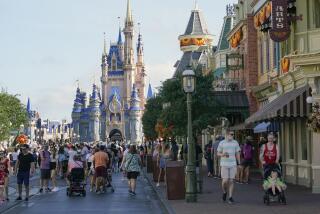Hong Kong Disneyland reports loss for 2015 as number of visitors drops
- Share via
Reporting from Beijing — At Hong Kong Disneyland, the fairy tale just got a reality check.
The theme park posted a net loss of $19 million in fiscal 2015 (which ended in September), according to a new report this week by the Hong Kong government, a part owner of the resort. A decreasing number of mainland Chinese visitors as well as “overall market condition and sentiment” were to blame, the report said.
More difficult days may be on the horizon. The Shanghai Disney Resort is scheduled to open in June, sparking concerns that mainland Chinese, who make up more than 40% of the visitors at Hong Kong Disneyland, will opt for a closer-to-home experience.
The $5.5-billion Shanghai park is almost three times bigger than Hong Kong Disneyland. Market analysts estimate that Shanghai park will attract 15 million to 25 million visitors in its first year, compared to 6.8 million visitors at Hong Kong Disneyland last year. (Hong Kong, a former British colony, is a semi-autonomous Chinese territory.)
Disney executives have stood by their decision to open two parks.
“There is a certain amount of the fan base that insists on visiting both, but for the most part they draw from the regions they’re located in. So we see the advantage in having a park in Shanghai to draw from this region, and [in the meantime] continuing to develop Hong Kong and invest in new attractions,” Bob Weis, executive vice president of Walt Disney Imagineering, said last summer.
Despite Disney’s optimism, the numbers in this week’s report offer a sobering picture:
- Visits are down: Hong Kong Disneyland received 6.8 million visitors in 2015, 9% fewer than in 2014.
- Mainlanders are staying away: In the fiscal year of 2015, mainland visitors accounted for 41% of total attendance, down from 48% in the previous fiscal year.
- Revenue is dropping: Hong Kong Disneyland’s total revenue in fiscal 2015 was $655 million, a year-on-year decrease of 6%.
- Profit is off: Fiscal 2015 also recorded a net loss of $19 million, as compared to a profit of $43 million in fiscal 2014.
- Hotel rooms are emptier: Hotel occupancy dropped from 93% in fiscal 2014 to 79% last year.
To boost its appeal, Hong Kong Disneyland has announced several initiatives, including a new hotel and an ambitious park expansion. A new “Iron Man”-themed area scheduled to open in late 2016 will feature the Iron Man Experience, a motion-based ride presenting the American superhero in the streets of Hong Kong.
“In view of the intensifying competition in the region, and the opening of the Shanghai Disney Resort in June this year, the Hong Kong Disneyland has planned a series of developments in the pipeline in order to give full play to its international features, and maintain its distinctiveness and competitiveness,” the report said.
Iron Man, apparently, has a new rescue mission ahead.
Xu and Liu are special correspondents.
More to Read
Sign up for The Envelope
Get exclusive awards season news, in-depth interviews and columnist Glenn Whipp’s must-read analysis straight to your inbox.
You may occasionally receive promotional content from the Los Angeles Times.










